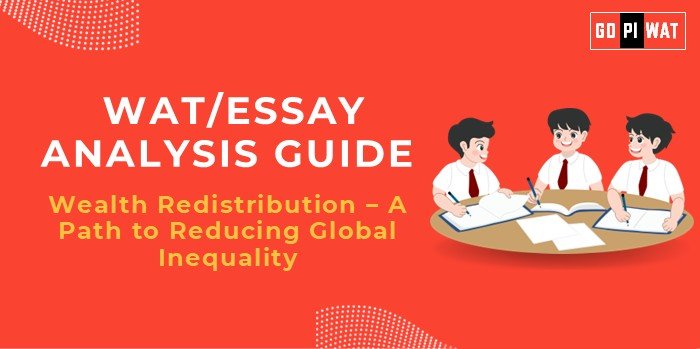📋 WRITTEN ABILITY TEST (WAT)/ESSAY ANALYSIS GUIDE
Topic: Wealth Redistribution – A Path to Reducing Global Inequality
🌟 Understanding Wealth Redistribution’s Importance
Wealth redistribution is a critical tool in addressing global poverty and inequality. For business school students, comprehending its implications is essential as it intersects with economic policies, corporate strategies, and ethical considerations in business.
🕒 Effective Planning and Writing
- Time Allocation:
- 📝 Planning: 5 minutes
- ✍️ Writing: 20 minutes
- 🔍 Review: 5 minutes
- Preparation Tips:
- 📊 Gather recent data and case studies on wealth inequality and redistribution efforts.
- 🌍 Understand different perspectives and the potential impacts of redistribution policies.
💡 Structuring the Essay
Introduction Techniques
- Contrast Approach: “While global wealth has reached unprecedented levels, with the richest 1% owning 46% of it, over 700 million people still live in extreme poverty. This disparity raises critical questions about the need for wealth redistribution as a global priority.”
- Solution-Oriented Approach: “By introducing global wealth taxes and robust welfare systems, nations can address the growing gap between the wealthy and the underprivileged, creating a more equitable world.”
- Historical Context Approach: “Redistribution policies have historically lifted millions out of poverty, from Roosevelt’s New Deal in the US to modern Scandinavian welfare states, showing the potential of these interventions to drive societal progress.”
🏆 Achievements
- Impact of Wealth Redistribution:
- 🌍 Nordic countries have significantly reduced income inequality through progressive taxation and welfare programs.
- 🇧🇷 Brazil’s Bolsa Família lifted millions out of poverty, cutting extreme poverty by 16% in a decade.
- 🤝 Redistribution improves social cohesion, reduces crime rates, and fosters political stability.
⚠️ Challenges
- Resistance to Redistribution:
- 💰 Wealthy individuals and corporations often use tax havens to evade redistribution policies.
- ⚙️ Administrative inefficiencies and corruption hinder program implementation in developing countries.
- Global Comparison: “While Scandinavian countries efficiently manage redistribution, nations like South Africa struggle with implementation due to systemic issues.”
🚀 Future Perspective
- Recommendations:
- 🌐 Implement global agreements on wealth taxation to prevent tax evasion.
- 📈 Use technology, such as blockchain, to ensure transparency in welfare distribution.
- 🤝 Encourage public-private partnerships to align corporate interests with social goals.
📄 Concluding Effectively
- Balanced Conclusion: “Wealth redistribution is a powerful tool for addressing poverty and inequality, but its success depends on efficient implementation and balanced economic policies that promote both equity and growth.”
- Global Comparison Conclusion: “Learning from the successes of Nordic countries and addressing the challenges faced by developing economies, the global community must prioritize wealth redistribution to achieve sustainable and inclusive growth.”
✍️ Sample Short Essays
- Balanced Perspective:
“Wealth redistribution remains a contentious yet vital strategy to bridge the gap between the affluent and the impoverished. While progressive taxation and welfare programs have demonstrated success in Nordic countries, the global implementation of such policies requires careful design to balance equity and economic growth.”
- Solution-Oriented:
“To address the stark disparities in global wealth distribution, nations must adopt a collaborative approach. Policies such as global wealth taxes, transparent governance, and equitable access to education and healthcare can break the cycle of poverty and promote sustainable development.”
- Global Comparison:
“The successes of welfare economies like Sweden and Denmark offer valuable lessons on wealth redistribution. However, challenges faced by nations like South Africa underscore the importance of tailored solutions that consider unique socio-economic contexts.”
🌟 Recommendations for Sustainable Progress
- 🌐 Global Wealth Tax Agreements: Collaborate internationally to close tax loopholes and address wealth concentration in tax havens.
- 🔒 Technology for Transparency: Use AI and blockchain to minimize corruption and ensure equitable distribution of resources.
- ⚙️ Capacity Building: Strengthen administrative systems in developing countries to enhance efficiency in implementing welfare programs.
📚 Additional Insights for B-School Students
Real-World Applications:
- 📊 Analyze global redistribution policies as part of public policy or CSR curricula.
- 🌍 Evaluate corporate taxation’s role in addressing inequality.
Key Interview Questions:
- 🤔 “How can businesses contribute to wealth redistribution without compromising profitability?”
- 📈 “What role do global frameworks play in addressing income inequality?”


